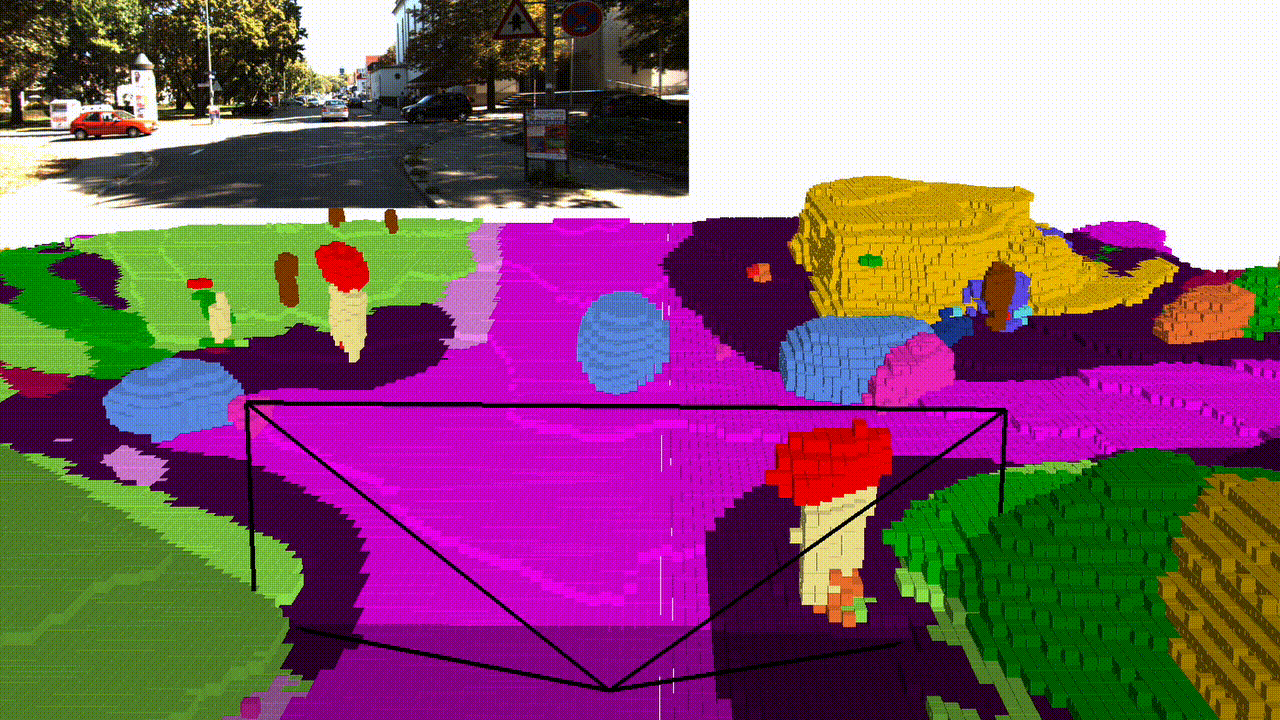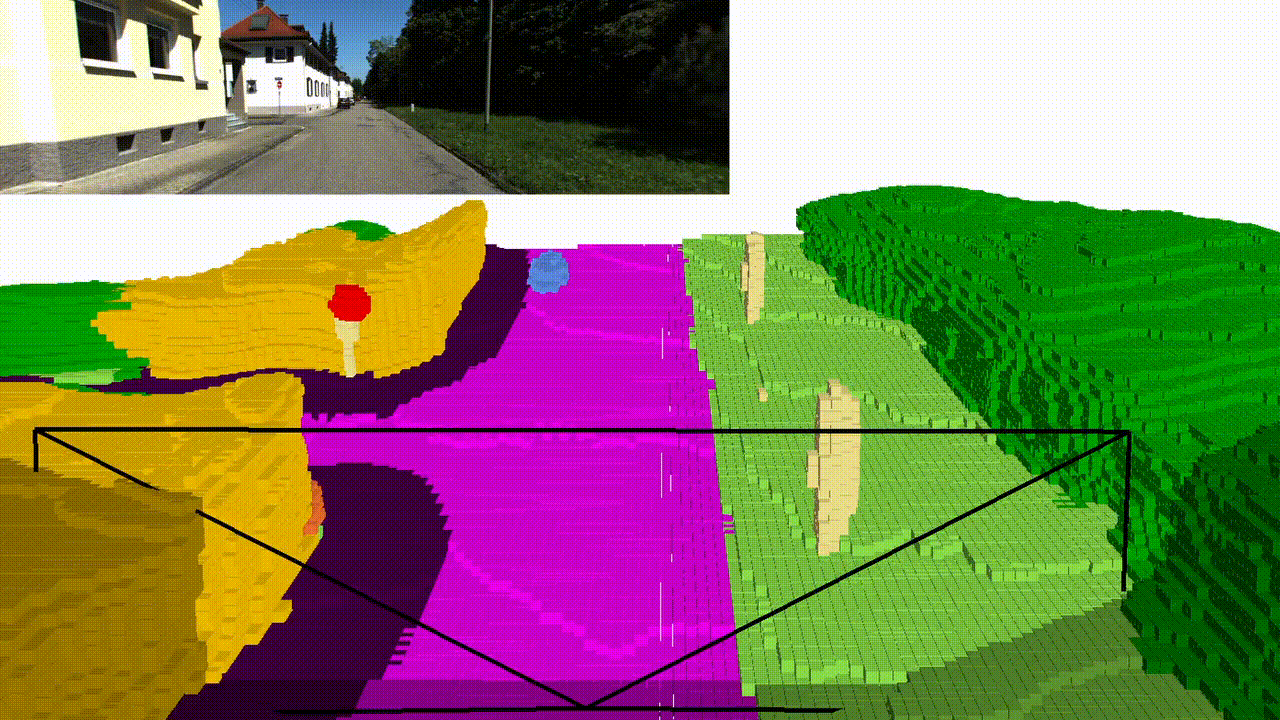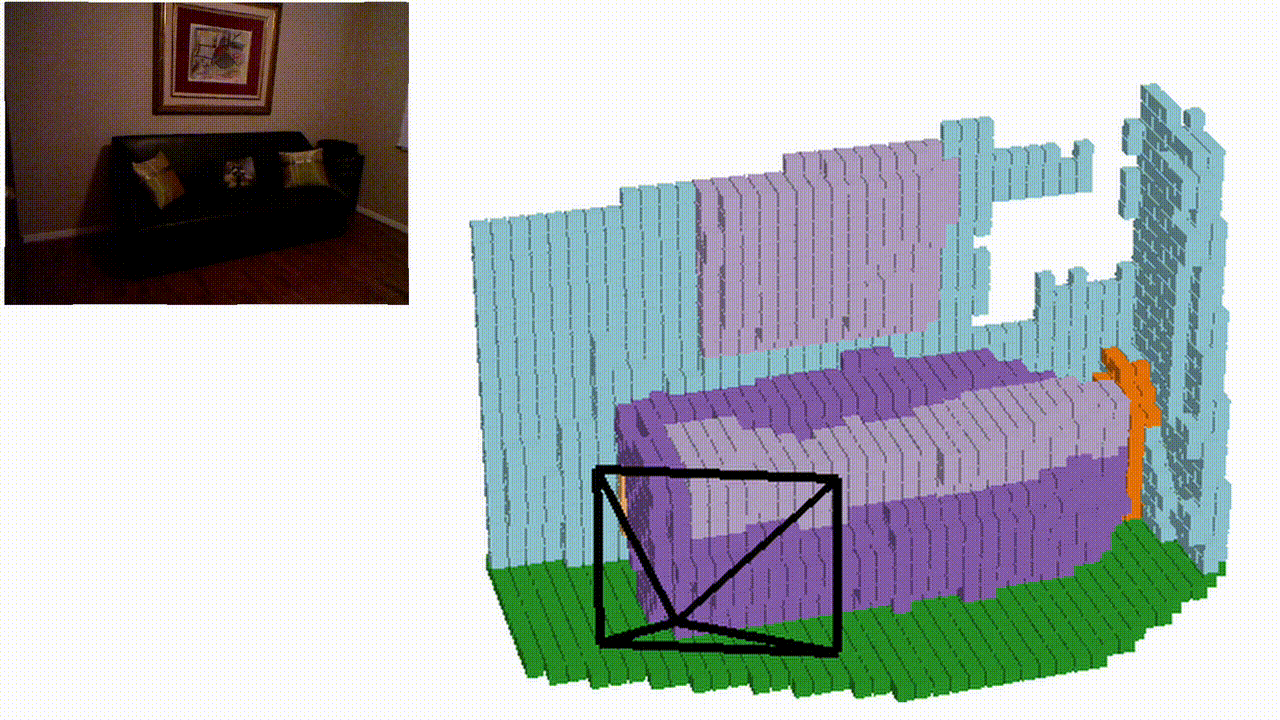MonoScene: Monocular 3D Semantic Scene Completion
Anh-Quan Cao,
Raoul de Charette
Inria, Paris, France.
CVPR 2022


If you find this work or code useful, please cite our paper and give this repo a star:
@inproceedings{cao2022monoscene,
title={MonoScene: Monocular 3D Semantic Scene Completion},
author={Anh-Quan Cao and Raoul de Charette},
booktitle={CVPR},
year={2022}
}
| SemanticKITTI | KITTI-360 (Trained on SemanticKITTI) |
|---|---|
 |
 |
NYUv2
- 6/12/2022: We extend MonoScene to self-supervised setting but geometry-only estimation in the followup work: SceneRF 📣
- 28/6/2022: We added MonoScene demo on Hugging Face
- 13/6/2022: We added a tutorial on How to define viewpoint programmatically in mayavi
- 12/6/2022: We added a guide on how to install mayavi
- 9/6/2022: We fixed the installation errors mentioned in astra-vision#18
- Create conda environment:
$ conda create -y -n monoscene python=3.7
$ conda activate monoscene
- This code was implemented with python 3.7, pytorch 1.7.1 and CUDA 10.2. Please install PyTorch:
$ conda install pytorch==1.7.1 torchvision==0.8.2 torchaudio==0.7.2 cudatoolkit=10.2 -c pytorch
- Install the additional dependencies:
$ cd MonoScene/
$ pip install -r requirements.txt
- Install tbb:
$ conda install -c bioconda tbb=2020.2
- Downgrade torchmetrics to 0.6.0
$ pip install torchmetrics==0.6.0
- Finally, install MonoScene:
$ pip install -e ./
Here is Docker setup for MonoScene. You can use the following commands to build the docker image and run the container.
Clone the git repository
git clone https://github.com/astra-vision/MonoScene.git
cd MonoScene
Pull docker image
docker pull sohaibanwaar/monoscene
Run docker Image
docker run -it -p 8888:8888 --gpus all -v /path/to/MonoScene:/MonoScene sohaibanwaar/monoscene /bin/bash
Activate Environment
conda activate monoscene
Run Jupyter Notebook
nohup jupyter notebook --ip 0.0.0.0 --no-browser --allow-root &
-
You need to download
- The Semantic Scene Completion dataset v1.1 (SemanticKITTI voxel data (700 MB)) from SemanticKITTI website
- The KITTI Odometry Benchmark calibration data (Download odometry data set (calibration files, 1 MB)) and the RGB images (Download odometry data set (color, 65 GB)) from KITTI Odometry website.
-
Create a folder to store SemanticKITTI preprocess data at
/path/to/kitti/preprocess/folder. -
Store paths in environment variables for faster access (Note: folder 'dataset' is in /path/to/semantic_kitti):
$ export KITTI_PREPROCESS=/path/to/kitti/preprocess/folder
$ export KITTI_ROOT=/path/to/semantic_kitti
- Preprocess the data to generate labels at a lower scale, which are used to compute the ground truth relation matrices:
$ cd MonoScene/
$ python monoscene/data/semantic_kitti/preprocess.py kitti_root=$KITTI_ROOT kitti_preprocess_root=$KITTI_PREPROCESS
-
Download the NYUv2 dataset.
-
Create a folder to store NYUv2 preprocess data at
/path/to/NYU/preprocess/folder. -
Store paths in environment variables for faster access:
$ export NYU_PREPROCESS=/path/to/NYU/preprocess/folder
$ export NYU_ROOT=/path/to/NYU/depthbin
- Preprocess the data to generate labels at a lower scale, which are used to compute the ground truth relation matrices:
$ cd MonoScene/
$ python monoscene/data/NYU/preprocess.py NYU_root=$NYU_ROOT NYU_preprocess_root=$NYU_PREPROCESS
-
We only perform inference on KITTI-360. You can download either the Perspective Images for Train & Val (128G) or the Perspective Images for Test (1.5G) at http://www.cvlibs.net/datasets/kitti-360/download.php.
-
Create a folder to store KITTI-360 data at
/path/to/KITTI-360/folder. -
Store paths in environment variables for faster access:
$ export KITTI_360_ROOT=/path/to/KITTI-360
Download MonoScene pretrained models on SemanticKITTI and on NYUv2, then put them in the folder /path/to/MonoScene/trained_models.
To train MonoScene with SemanticKITTI, type:
-
Create folders to store training logs at /path/to/kitti/logdir.
-
Store in an environment variable:
$ export KITTI_LOG=/path/to/kitti/logdir
- Train MonoScene using 4 GPUs with batch_size of 4 (1 item per GPU) on Semantic KITTI:
$ cd MonoScene/
$ python monoscene/scripts/train_monoscene.py \
dataset=kitti \
enable_log=true \
kitti_root=$KITTI_ROOT \
kitti_preprocess_root=$KITTI_PREPROCESS\
kitti_logdir=$KITTI_LOG \
n_gpus=4 batch_size=4
-
Create folders to store training logs at /path/to/NYU/logdir.
-
Store in an environment variable:
$ export NYU_LOG=/path/to/NYU/logdir
- Train MonoScene using 2 GPUs with batch_size of 4 (2 item per GPU) on NYUv2:
$ cd MonoScene/
$ python monoscene/scripts/train_monoscene.py \
dataset=NYU \
NYU_root=$NYU_ROOT \
NYU_preprocess_root=$NYU_PREPROCESS \
logdir=$NYU_LOG \
n_gpus=2 batch_size=4
To evaluate MonoScene on SemanticKITTI validation set, type:
$ cd MonoScene/
$ python monoscene/scripts/eval_monoscene.py \
dataset=kitti \
kitti_root=$KITTI_ROOT \
kitti_preprocess_root=$KITTI_PREPROCESS \
n_gpus=1 batch_size=1
To evaluate MonoScene on NYUv2 test set, type:
$ cd MonoScene/
$ python monoscene/scripts/eval_monoscene.py \
dataset=NYU \
NYU_root=$NYU_ROOT\
NYU_preprocess_root=$NYU_PREPROCESS \
n_gpus=1 batch_size=1
Please create folder /path/to/monoscene/output to store the MonoScene outputs and store in environment variable:
export MONOSCENE_OUTPUT=/path/to/monoscene/output
To generate the predictions on the NYUv2 test set, type:
$ cd MonoScene/
$ python monoscene/scripts/generate_output.py \
+output_path=$MONOSCENE_OUTPUT \
dataset=NYU \
NYU_root=$NYU_ROOT \
NYU_preprocess_root=$NYU_PREPROCESS \
n_gpus=1 batch_size=1
To generate the predictions on the Semantic KITTI validation set, type:
$ cd MonoScene/
$ python monoscene/scripts/generate_output.py \
+output_path=$MONOSCENE_OUTPUT \
dataset=kitti \
kitti_root=$KITTI_ROOT \
kitti_preprocess_root=$KITTI_PREPROCESS \
n_gpus=1 batch_size=1
Here we use the sequence 2013_05_28_drive_0009_sync, you can use other sequences. To generate the predictions on KITTI-360, type:
$ cd MonoScene/
$ python monoscene/scripts/generate_output.py \
+output_path=$MONOSCENE_OUTPUT \
dataset=kitti_360 \
+kitti_360_root=$KITTI_360_ROOT \
+kitti_360_sequence=2013_05_28_drive_0009_sync \
n_gpus=1 batch_size=1
We use mayavi to visualize the predictions. Please install mayavi following the official installation instruction. Then, use the following commands to visualize the outputs on respective datasets.
If you have trouble installing mayavi, you can take a look at our mayavi installation guide.
If you have trouble fixing mayavi viewpoint, you can take a look at our tutorial.
You also need to install some packages used by the visualization scripts using the commands:
pip install tqdm
pip install omegaconf
pip install hydra-core
$ cd MonoScene/
$ python monoscene/scripts/visualization/NYU_vis_pred.py +file=/path/to/output/file.pkl
$ cd MonoScene/
$ python monoscene/scripts/visualization/kitti_vis_pred.py +file=/path/to/output/file.pkl +dataset=kitt
$ cd MonoScene/
$ python monoscene/scripts/visualization/kitti_vis_pred.py +file=/path/to/output/file.pkl +dataset=kitti_360
Anh-Quan Cao, Raoul de Charette
This work leverages generalizable neural radiance field (NeRF) to generate novel depths/views, conditioned on a single input frame. The novel depths/views are subsequently used to reconstruct the 3D mesh of the scene.
Yuanhui Huang*, Wenzhao Zheng* , Yunpeng Zhang, Jie Zhou, Jiwen Lu.
An impressive work that predicts the full 360-degree 3D semantic occupancy solely from images using Tri-plane representation with transformer.
MonoScene is released under the Apache 2.0 license.

